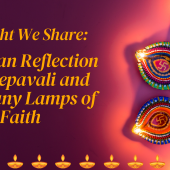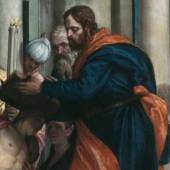Jesus the Light of the World (Jn 9:1-41)

“I am the light of the world” (John 9,1-41)
A. Text:
As he passed by he saw a man blind from birth. His disciples asked him, "Rabbi, who sinned, this man or his parents, that he was born blind?" Jesus answered, "Neither he nor his parents sinned; it is so that the works of God might be made visible through him. We have to do the works of the one who sent me while it is day. Night is coming when no one can work. While I am in the world, I am the light of the world."
When he had said this, he spat on the ground and made clay with the saliva, and smeared the clay on his eyes, and said to him, "Go wash in the Pool of Siloam" (which means Sent). So he went and washed, and came back able to see. His neighbors and those who had seen him earlier as a beggar said, "Isn't this the one who used to sit and beg?" Some said, "It is," but others said, "No, he just looks like him." He said, "I am." So they said to him, "(So) how were your eyes opened?" He replied, "The man called Jesus made clay and anointed my eyes and told me, 'Go to Siloam and wash.' So I went there and washed and was able to see." And they said to him, "Where is he?" He said, "I don't know."
They brought the one who was once blind to the Pharisees. Now Jesus had made clay and opened his eyes on a sabbath. So then the Pharisees also asked him how he was able to see. He said to them, "He put clay on my eyes, and I washed, and now I can see." So some of the Pharisees said, "This man is not from God, because he does not keep the sabbath." (But) others said, "How can a sinful man do such signs?" And there was a division among them. So they said to the blind man again, "What do you have to say about him, since he opened your eyes?" He said, "He is a prophet." Now the Jews did not believe that he had been blind and gained his sight until they summoned the parents of the one who had gained his sight. They asked them, "Is this your son, who you say was born blind? How does he now see?" His parents answered and said, "We know that this is our son and that he was born blind. We do not know how he sees now, nor do we know who opened his eyes. Ask him, he is of age; he can speak for himself." His parents said this because they were afraid of the Jews, for the Jews had already agreed that if anyone acknowledged him as the Messiah, he would be expelled from the synagogue. For this reason his parents said, "He is of age; question him." So a second time they called the man who had been blind and said to him, "Give God the praise! 6 We know that this man is a sinner." He replied, "If he is a sinner, I do not know. One thing I do know is that I was blind and now I see." So they said to him, "What did he do to you? How did he open your eyes?" He answered them, "I told you already and you did not listen. Why do you want to hear it again? Do you want to become his disciples, too?" They ridiculed him and said, "You are that man's disciple; we are disciples of Moses! We know that God spoke to Moses, but we do not know where this one is from." The man answered and said to them, "This is what is so amazing, that you do not know where he is from, yet he opened my eyes. We know that God does not listen to sinners, but if one is devout and does his will, he listens to him. It is unheard of that anyone ever opened the eyes of a person born blind. If this man were not from God, he would not be able to do anything." They answered and said to him, "You were born totally in sin, and are you trying to teach us?" Then they threw him out.
When Jesus heard that they had thrown him out, he found him and said, "Do you believe in the Son of Man?" He answered and said, "Who is he, sir, that I may believe in him?" Jesus said to him, "You have seen him and the one speaking with you is he." He said, "I do believe, Lord," and he worshiped him. Then Jesus said, "I came into this world for judgment, so that those who do not see might see, and those who do see might become blind." Some of the Pharisees who were with him heard this and said to him, "Surely we are not also blind, are we?" Jesus said to them, "If you were blind, you would have no sin; but now you are saying, 'We see,' so your sin remains.”
B. Exegesis:
1. With Jesus, the living Water, we journey this Sunday from Jacob’s Well in Samaria to the Temple area in Jerusalem.
We see Jesus healing a man born blind. We hear Him saying “I am the light of the world.” What we see and hear is co-related. The healing miracle, the sixth sign in the Gospel of John, does illustrate that Jesus is truly the Light of the world.
2. Earlier Jesus said, “I am the light of the world. Whoever follows me will not walk in darkness, but will have the light of life” (8,12). Now these words become true in the person of the man born blind. This man, so wretched in life as he is destined to sit and beg for life, gradually believes in Jesus, the Light.
This is evident in the behaviour of the healed blind man. Unlike Naaman the Syrian who initially disobeyed the prophetic word of Elisha (2 Kings 5,12: “Are not the rivers of Damascus, the Abana and the Pharpar, better than all the waters of Israel? Could I not wash in them and be cleansed?” With this, he turned about in anger and left”), goes he straight to the waters of Siloam with mud smeared on his eyes, shut from birth.
Here the man born blind obeys, unlike Saul but like Samuel (1 Samuel 16), the word of the Lord, “Go wash in the Pool of Siloam.” The seeds of faith in Jesus, the Sent by the Father (=Siloam), have already been planted in the field of his heart. So he wins this test of faith: “went and washed and came back able to see.”
3. The physical sight the blind man received out of initial faith leads him now to a deeper faith and following and own eventually “the light of life.” Reminiscent of the Epitaph of John Henry Newman which reads ‘Ex umbris et imaginibus in veritatem’ (‘Out of shadows and images into truth’), the man born blind walks out of darkness and comes to Jesus the Light.
It is like Samuel who realized the divine truth/ light that the way God sees is far different from the way man sees: “But the LORD said to Samuel: “Do not judge from his appearance or from his lofty stature, because I have rejected him. Not as man sees does God see, because man sees the appearance but the LORD looks into the heart” (1 Samuel 16).
This unwavering walk of the enlightened man is also evident in his behaviour. For him, Jesus is now a “prophet”, “from God”, “devout”, and a doer of God’ will and he boldly proclaims it in a gravely hostile situation of darkness, represented by the Jews and the Pharisees in particular, who consider Him “a sinner” who broke the Law of Sabbath.
For doing so, the healed man pays the big price of excommunication: “Then they threw him out.” He goes through an experience of excruciating pain, as he is totally cut off now from the Jewish synagogue and the community life.
Nevertheless the man mounts on the summit of his faith, seasoned with Jewish hostility and ostracism, as he now professes “I do believe, Lord” and “worshipped him.” The seeds of faith, sown in the field of his heart, bear now an abundant harvest!
C. Application:
4. Jesus continued to be the Light of the world. People continued to own the Light of Christ and receive the light of life. They too suffered on their faith odyssey like the blind man in John.
St. Paul, who realized later the paradox of the cross (1 Corinthians 1,23-24: “but we proclaim Christ crucified, a stumbling block to Jews and foolishness to Gentiles, but to those who are called, Jews and Greeks alike, Christ the power of God and the wisdom of God”) is one among them:
“Five times at the hands of the Jews I received forty lashes minus one. Three times I was beaten with rods, once I was stoned, three times I was shipwrecked, I passed a night and a day on the deep; on frequent journeys, in dangers from rivers, dangers from robbers, dangers from my own race, dangers from Gentiles, dangers in the city, dangers in the wilderness, dangers at sea, dangers among false brothers; in toil and hardship, through many sleepless nights, through hunger and thirst, through frequent fastings, through cold and exposure” (2 Corinthians 11,24-27).
He is not the first, the last or the only one to experience Jesus, the Light of all humanity.
Radio Veritas Asia (RVA), a media platform of the Catholic Church, aims to share Christ. RVA started in 1969 as a continental Catholic radio station to serve Asian countries in their respective local language, thus earning the tag “the Voice of Asian Christianity.” Responding to the emerging context, RVA embraced media platforms to connect with the global Asian audience via its 21 language websites and various social media platforms.














